A kettle to feed thousands: The iconic Salvation Army kettles turn 30
Salt&Light wishes Salvation Army Singapore's Christmas Kettling drive a happy 30th anniversary.
by Geraldine Tan // December 14, 2018, 11:30 pm
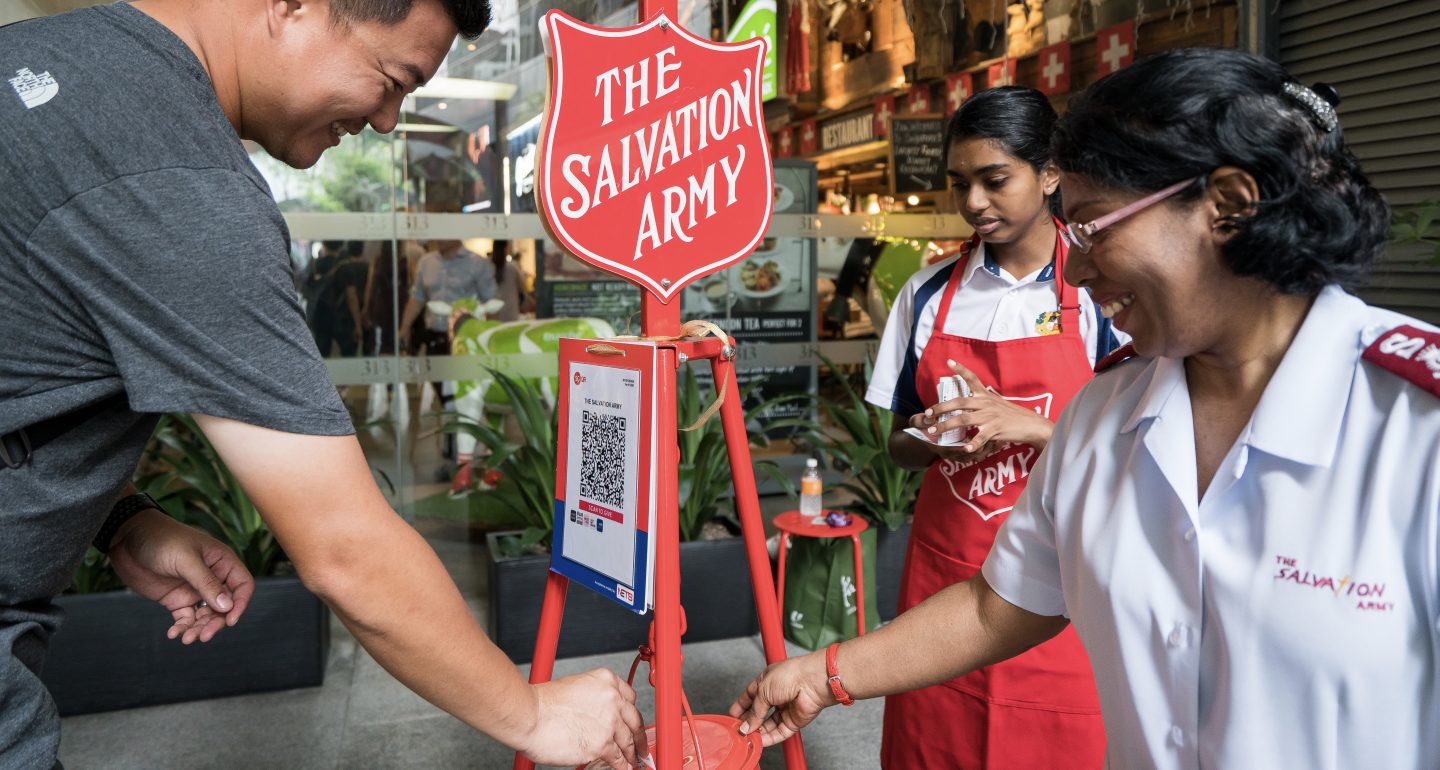
"It is primarily and mainly for the sake of saving the soul that I seek the salvation of the body," said Salvation Army founder William Booth. Photo by Rachel Phua.
In an age of brighter-lights-win and electronic-everything, one 127-year-old tradition has withstood the test of time amidst the high-tech festivities.
The red Salvation Army kettles manned by uniformed men and women ringing old-school “ice cream” bells are still as synonymous with Christmas as the carols that fill the air this time of year.
Chances are, you have dropped in some spare change yourself.
What you may not know is how your donations have transformed the lives of fellow Singaporeans.
1,000 hot meals
How did the tradition start anyway?
“You cannot warm the hearts of people with God’s love if they have an empty stomach and cold feet.”
The red kettle tradition began in December 1891 with Salvation Army Captain Joseph McFee’s desire to provide a hot Christmas dinner to 1,000 poor people in San Francisco, USA. But he had no way to pay for it.
Remembering that, as a sailor in Liverpool, England, he had seen a large pot on the docks of the city’s waterfront where charitable donations could be given, McFee got permission to place a pot at a ferry landing with a sign that read: “Keep the pot boiling.”
Soon, he had all the money he needed to fund the Christmas dinner.
Now, 127 years later, McFee’s fundraising idea is being carried out in nearly every continent on earth, with the exception of Antarctica. Funds raised continue to go to the poor and needy.
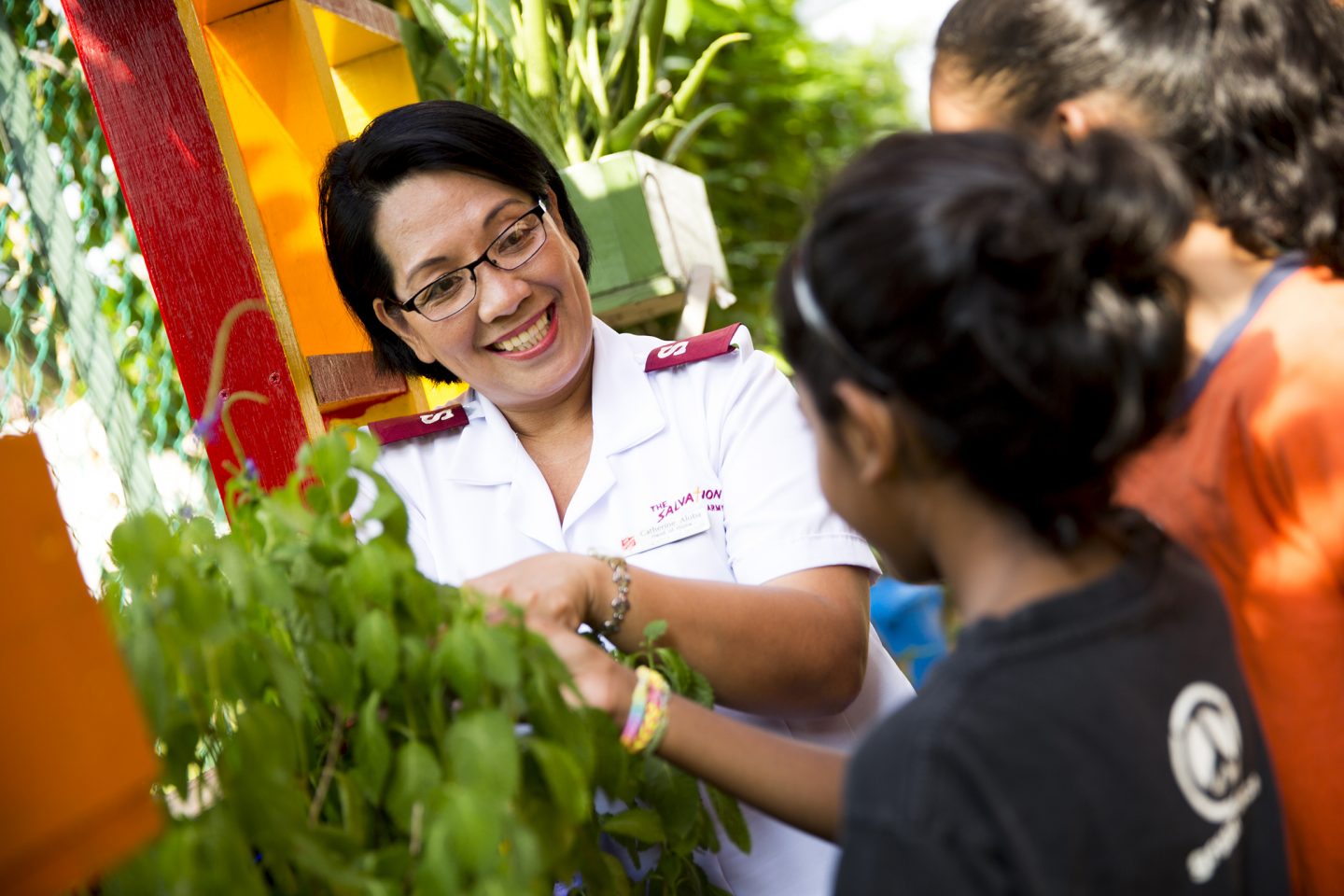
“It doesn’t matter if you are nine or 99, God still sees value in you and so we see value in people,” said Lieutenant-Colonel Garth Niemand. Photo courtesy of The Salvation Army, Singapore.
As William Booth, founder of The Salvation Army, famously said: “I must assert in the most unqualified way that it is primarily and mainly for the sake of saving the soul that I seek the salvation of the body. You cannot warm the hearts of people with God’s love if they have an empty stomach and cold feet.”
A mother in prison is still a mother
Here in Singapore, the kettles have been a Christmas tradition since 1988.
Donations raised go towards the Salvation Army’s social programmes to meet the needs of young and old, such as the Gracehaven children’s home and the 400-bed Peacehaven Nursing Home, a forerunner in dementia care in Singapore.
“For us, that pot still represents the needs of the community, the needs of the people,” said Lieutenant-Colonel Garth Niemand, 49, chief secretary of The Salvation Army, Singapore.
“We always think of prisoners as people who’ve done bad things. But they’re people just like us. They just made wrong decisions.”
“Everybody has value. Our fundamental belief in the Gospel is that God sees everybody the same, it doesn’t matter who you are. So, it doesn’t matter if you are nine or 99, God still sees value in you and so we see value in people,” he said.
A case in point is its Prison Support Services – Kids In Play programme.
The programme addresses the impact of a parent’s incarceration on his or her children. Counselling and activities such as camps and outings, as well as a Family Bonding Programme where parents and children are allowed to interact, help the inmates to stay motivated to rehabilitate, and prevent the family unit from breaking down.
Niemand recounted a visit to the women’s prison, where the children just ran into the arms of their mothers: “You realise that they have this criminal record now but, in their heart of hearts, they’re mothers of these children that they love. And you can just see that love as they embrace their children.
“We always think of prisoners as people who’ve done bad things and that’s why they are locked up. But they’re people just like us. They made wrong decisions, they made a mistake, so these kids live with that stigma of their parents being in prison.”

The Salvation Army’s Family Bonding Programme helps families break the cycle of incarcerated-parents-incarcerated-children. Photo courtesy of The Salvation Army, Singapore.
The Salvation Army hopes these interventions will break the vicious cycle of criminal parents, criminal children.
He adds: “It’s not a genetic thing, it’s all about choices. All of us have made wrong decisions in our lives, not as severe as those that would end up with us in prison, but we all make mistakes. So, we just want to make sure that these kids don’t fall prey to that and that they become confident contributors to society.”
The gold chain
It is not just the beneficiaries who have been moved.
The men and women of the Salvation Army, who patiently stand behind the kettles year after year, also have stories to tell of how the kettle tradition has touched them.
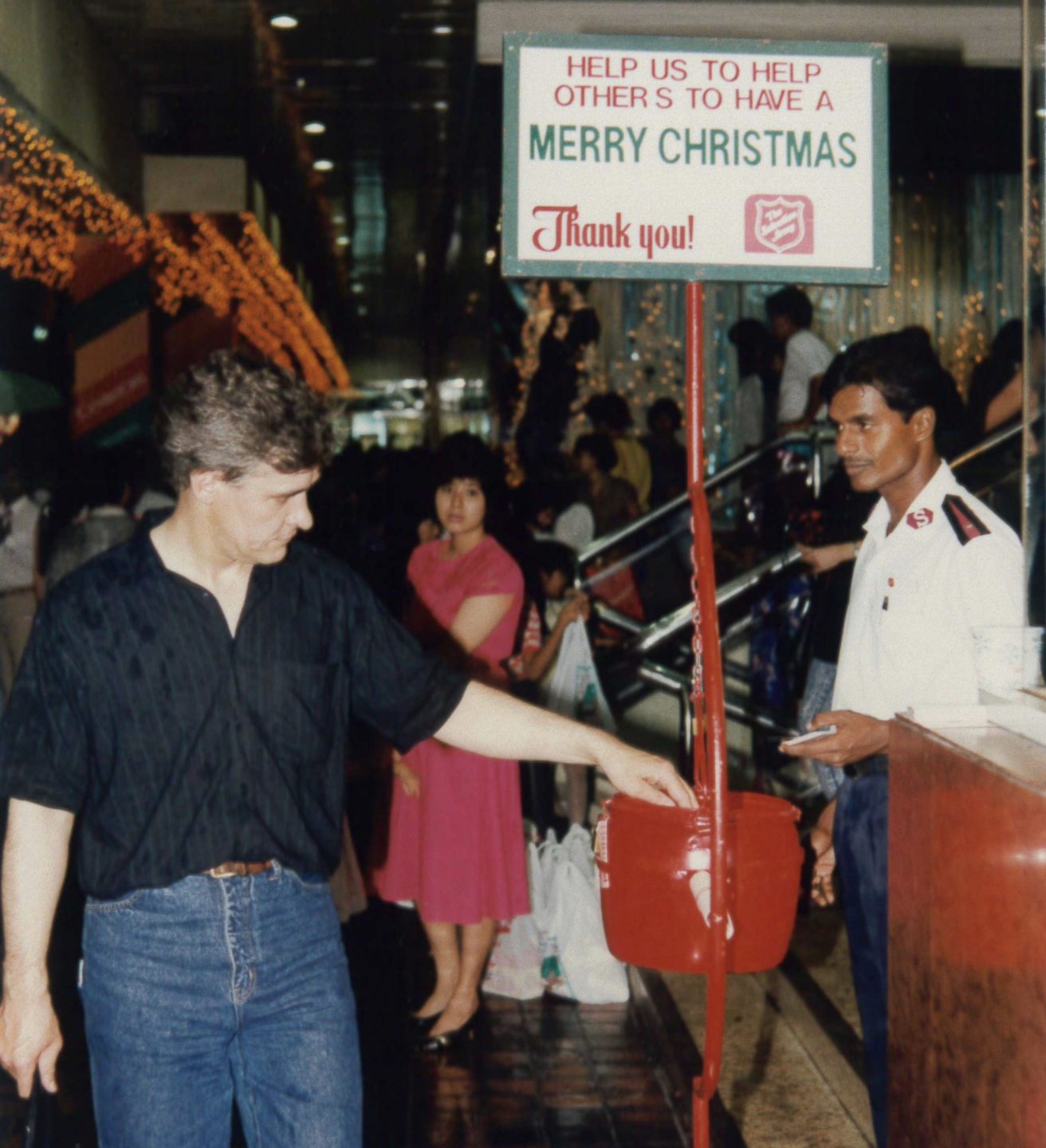
In their 23 years of manning the Christmas Kettles, P Kunam (above right, in his youth) and his wife Muniandy (below middle, in her youth) have had the chance to cross paths with many who have been blessed by the Salvation Army’s work with the community, and return to donate and bless others. Photo courtesy of The Salvation Army, Singapore.
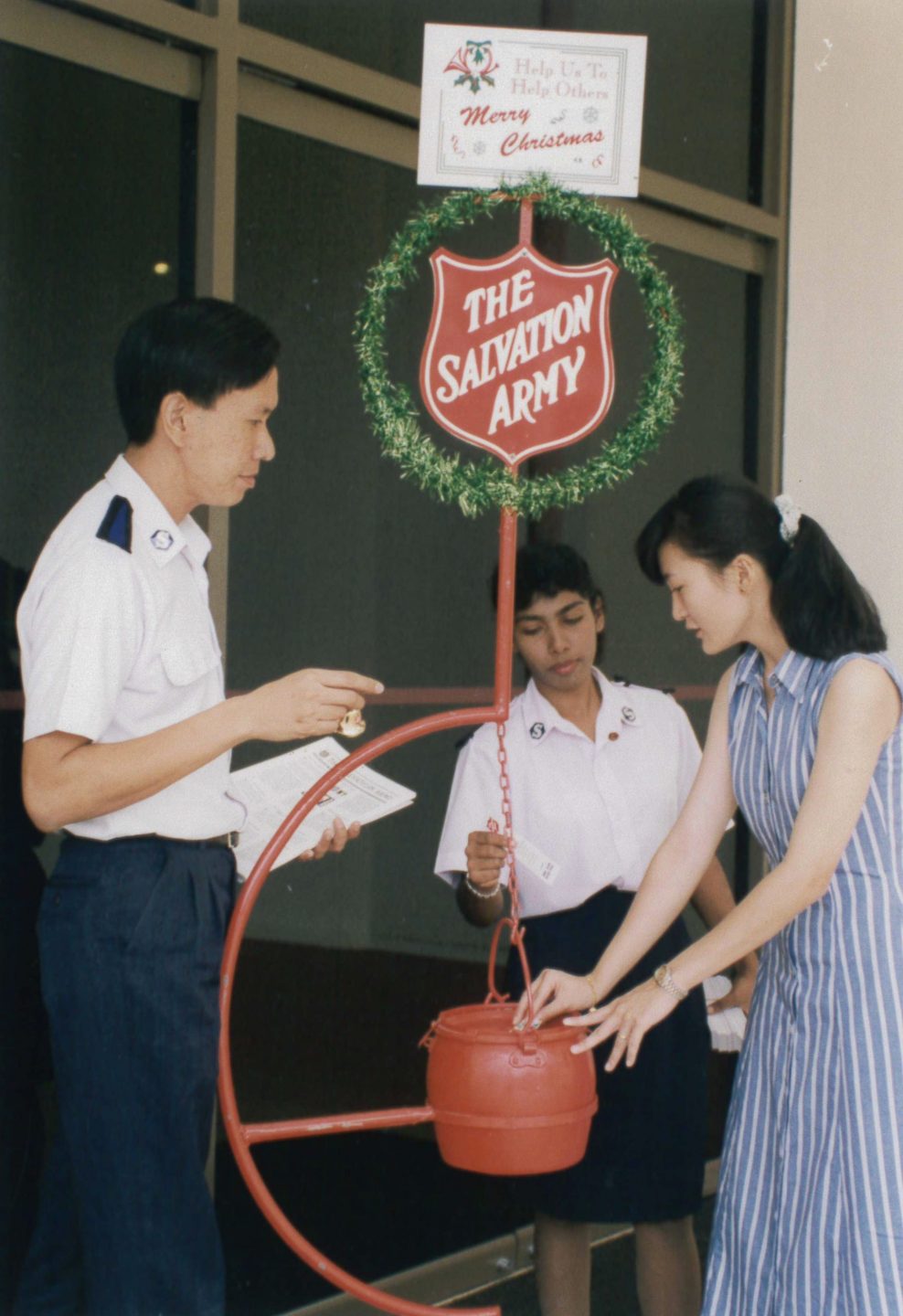
For the Kunam family, volunteering at the kettle stand has been a family affair for over a decade.
“I called the headquarters and said, ‘When you count the money, just be aware there’s a gold chain inside!'”
Seventeen-year-old student, Mercy Kunam, has been ringing the bell every Christmas since she was two, accompanying her parents, Vijaya Muniandy and P Kunam every year.
The couple, both Salvation Army officers, has been manning the kettle stands for 23 years. And when their two children came along they, too, joined in. In fact, Mercy’s elder brother Philemon had a headstart in kettling as Muniandy continued volunteering even when she was expecting.
“It was really tough for me then but I had a little stool there, so I would sit. I remember one day the stool moved and I just plopped on the floor. But I was okay,” the 49-year-old recalled with a laugh.
Her husband Kunam, 56, was quick to interject: “She’s braver than me at times!”
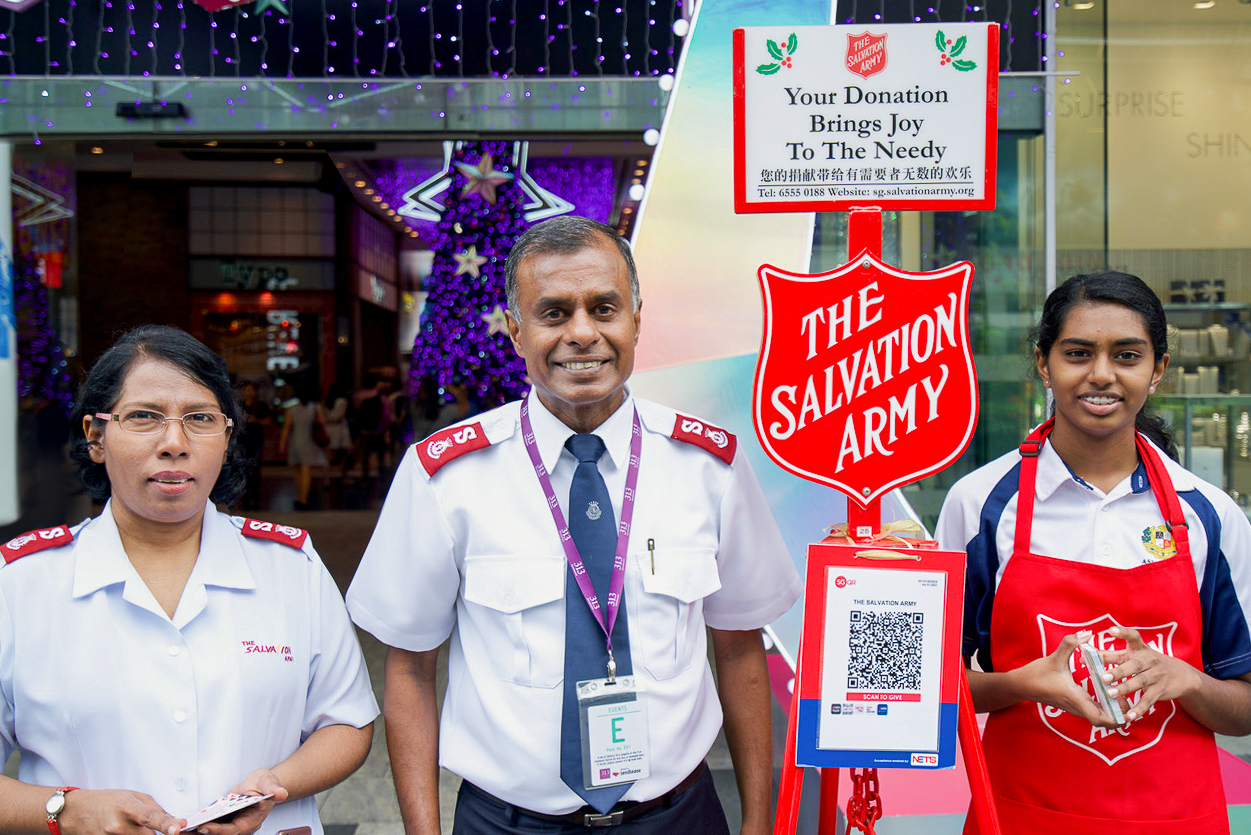
The Kunam family (from left to right: Muniandy, Kunam and Mercy) volunteers to man the booths together every year. Members of the public may also volunteer as bell ringers. Photo by Rachel Phua.
Over the years they have seen many passers-by dropping off change into the kettles and sometimes they even find shopping vouchers. But the most unusual donation was a gold chain.
Kunam recalled how he once noticed a Chinese man, clad in shorts and a singlet, pacing in front of his kettle one Christmas. The man abruptly stopped and asked: “Where does this money go?” To which Kunam explained that the money would be channelled to the Salvation Army’s social programmes.
Upon hearing that, the Chinese man took off his gold chain and asked: “Can I put this chain in?”
Surprised by the gesture, Kunam asked why.
The man revealed that someone had borrowed money from him but was unable to repay the debt and had paid it in kind with the chain. Guilt-ridden over the repayment, he wanted to donate the gold chain.
“That evening I called the headquarters and said, ‘When you count the money, just be aware there’s a gold chain inside.’ That’s an unforgettable incident!” said Kunam.
Faith and works, side by side
“We mustn’t let the affluence in Singapore blind us to the fact that there are people hurting in Singapore – there are needs and not just physical needs,” observed Neimand, who has been residing here since August 2015 with his wife, Patricia.
“The government can deal with ‘the machine’ but only the Church can deal with the hearts because it’s a God thing, it’s not a man thing. The Church has a big role to play in reconciling people with God, and with each other.”
However, he pointed out that there is a clear distinction between the work done by the Salvation Army Corps churches, and its social arm, The Salvation Army.
“Faith and works should travel side by side, step answering to step, like the legs of men walking.”
“We ring-fence all the money from the public for our social programmes, separate from our evangelical work in church community programmes. We have that as well, but that’s separate from our social programmes and our social fund. So that’s where the money is going, to help the community of Singapore, in essence.”
For every dollar spent from the Salvation Army’s Social Fund in the 2018 fiscal year, 94c went towards their social programmes to help Singaporeans.
One of the prison programme beneficiaries, Mary, shared: “I’d like to thank the Salvation Army for all the help and support that they have given me and my daughters. In the past, they would keep to themselves and were scared of being discriminated against by others. But now, they are more open and confident.”
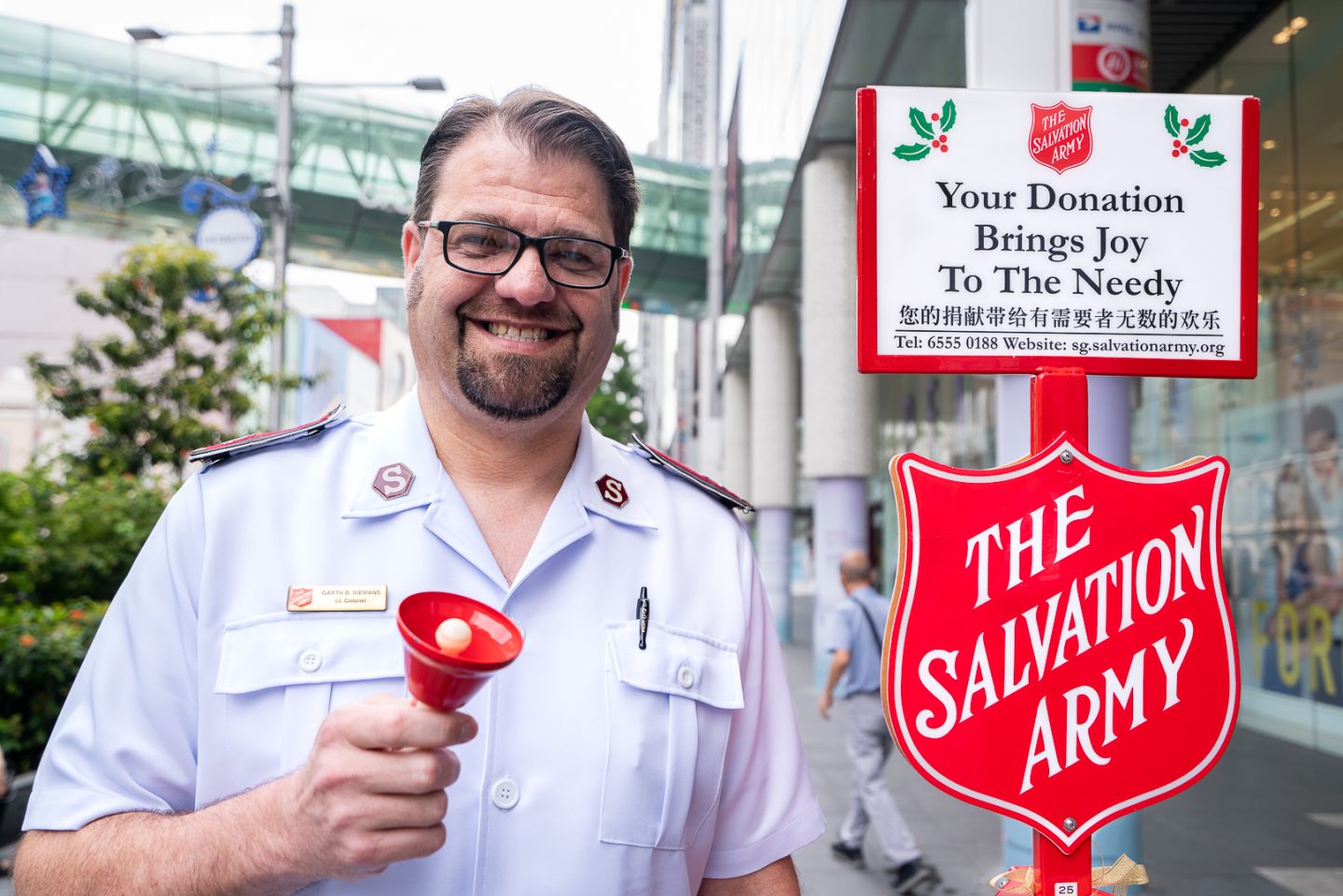
Lieutenant-Colonel Garth Niemand observes that there is no distinct donor profile as every type of person gives – the young, the old, the wealthy, the humble. Photo by Rachel Phua.
“Those faces that we don’t really see, the things that happen behind closed doors in families … those things may be hidden from us but they’re not hidden from God,” noted Niemand.
“People come with emotional needs and other things, which all ties up to the spiritual. That is because everyone’s real need is not their immediate needs; their real need is the need of a Saviour.
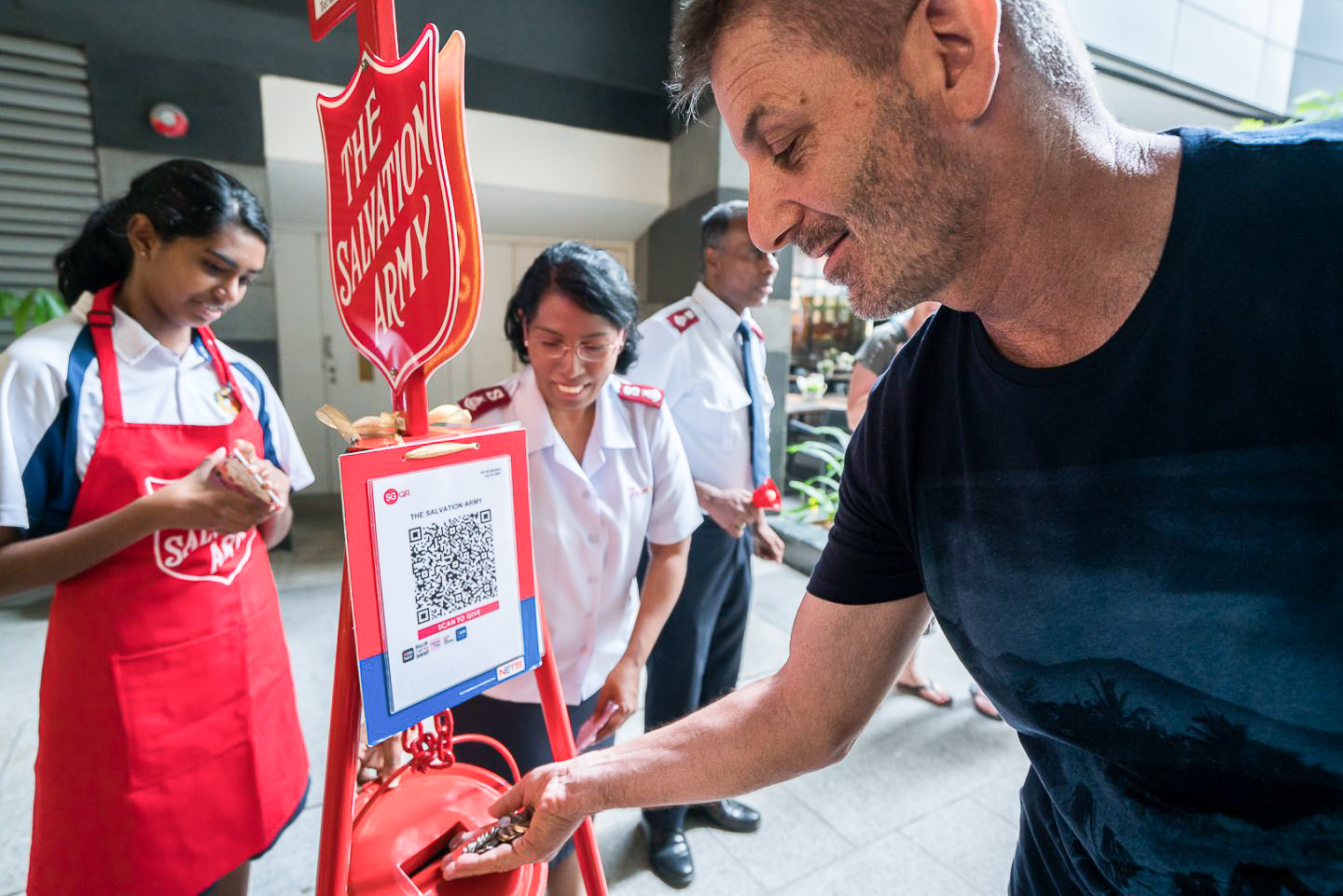
For every dollar spent by the Salvation Army Singapore’s Social Fund in the 2018 fiscal year, 94c went towards programmes to help the needy in the community. Photo courtesy of The Salvation Army, Singapore.
“My Christmas wish really is that all of us will be the hands and feet and voice of Jesus in our community, and that the Church will spread the message that there is a Saviour.”
As Salvation Army founder William Booth said: “Faith and works should travel side by side, step answering to step, like the legs of men walking. First faith, and then works; and then faith again, and then works again – until they can scarcely distinguish which is the one and which is the other.”
Looking to donate?
Spot the iconic red kettles and spread some Christmas cheer at these malls:
- 313@Somerset
- ION Orchard
- NEX
- Our Tampines Hub
- Raffles City
- TANGS at Tang Plaza
- The Centrepoint
- Toa Payoh HDB Hub
- Tiong Bahru Plaza
Donors receive a limited edition magnifying card or pocket calendar cards.
You may also go cashless here.
We are an independent, non-profit organisation that relies on the generosity of our readers, such as yourself, to continue serving the kingdom. Every dollar donated goes directly back into our editorial coverage.
Would you consider partnering with us in our kingdom work by supporting us financially, either as a one-off donation, or a recurring pledge?
Support Salt&Light


